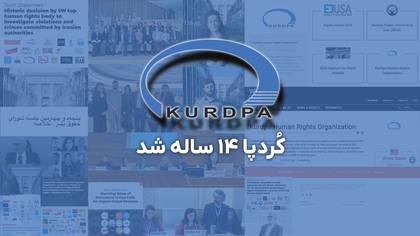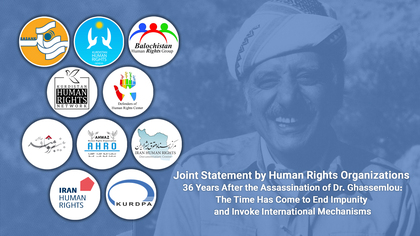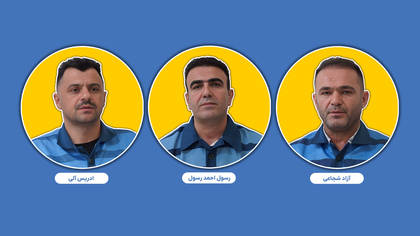Screws tighten on Iran as big buyers shun its oil
14:48 - 6 January 2012

Kurdpa - Iran faced the prospect of cutbacks in its oil sales to China and Japan as new measures to block Tehran\'s crude exports over its nuclear program appeared to be driving its economy to the wall.
The developments in Asia on Thursday followed news 24 hours earlier that EU leaders had agreed to halt European purchases of Iranian crude.
China, Iran\'s biggest trade partner, had already cut its purchases of Iranian oil by more than half this month and would extend the cuts to February, a Beijing-based trader who deals with Iranian oil said.
Japan would consider cutbacks in its Iranian oil purchases to secure a waiver from new U.S. sanctions signed into law on New Year\'s Eve by President Barack Obama, a government source said.
Between them, China, the EU and Japan buy about half of Iran\'s exports of 2.6 million barrels of oil per day.
International sanctions that for years had little effect are for the first time having a real impact on day-to-day life in Iran, where the rial currency has tumbled and people have rushed to convert savings into dollars.
Most oil traders still expect Iran to find buyers for its crude, but it will have to offer steeper discounts that will cut the hard currency revenue it needs to import food and other basic supplies for its 74 million people.
Iran has put on a brave face. Foreign Minister Ali Akbar Salehi said on Thursday the country would \"weather the storm.\"
\"Iran, with divine assistance, has always been ready to counter such hostile actions and we are not concerned at all about the sanctions,\" he told a news conference.
But in a sign it is seeking to alleviate the pressure, Salehi said Tehran was interested in resuming negotiations over its nuclear program with Western powers, who delivered an offer for talks via Turkey.
Iran is two months from a parliamentary election, the country\'s first since a disputed presidential vote in 2009 led to massive public demonstrations across the country.
The authorities put those protests down by force, but since then the Arab Spring has revealed the vulnerability of authoritarian governments in the region to public anger driven by economic hardship.
Iran\'s leaders have responded to the sanctions with military sabre-rattling, including a threat to blockade the Middle East\'s oil by shutting the Strait of Hormuz that leads to the Gulf, and even challenging a U.S. aircraft carrier if it sails the strait.
Washington says it will sail the strait at will and will guarantee free passage through the international waterway. Britain on Thursday signaled its readiness to use military force if necessary to keep the strait open, warning Iran not to miscalculate over the West\'s determination to stop disruption.
Source - Reuters
The developments in Asia on Thursday followed news 24 hours earlier that EU leaders had agreed to halt European purchases of Iranian crude.
China, Iran\'s biggest trade partner, had already cut its purchases of Iranian oil by more than half this month and would extend the cuts to February, a Beijing-based trader who deals with Iranian oil said.
Japan would consider cutbacks in its Iranian oil purchases to secure a waiver from new U.S. sanctions signed into law on New Year\'s Eve by President Barack Obama, a government source said.
Between them, China, the EU and Japan buy about half of Iran\'s exports of 2.6 million barrels of oil per day.
International sanctions that for years had little effect are for the first time having a real impact on day-to-day life in Iran, where the rial currency has tumbled and people have rushed to convert savings into dollars.
Most oil traders still expect Iran to find buyers for its crude, but it will have to offer steeper discounts that will cut the hard currency revenue it needs to import food and other basic supplies for its 74 million people.
Iran has put on a brave face. Foreign Minister Ali Akbar Salehi said on Thursday the country would \"weather the storm.\"
\"Iran, with divine assistance, has always been ready to counter such hostile actions and we are not concerned at all about the sanctions,\" he told a news conference.
But in a sign it is seeking to alleviate the pressure, Salehi said Tehran was interested in resuming negotiations over its nuclear program with Western powers, who delivered an offer for talks via Turkey.
Iran is two months from a parliamentary election, the country\'s first since a disputed presidential vote in 2009 led to massive public demonstrations across the country.
The authorities put those protests down by force, but since then the Arab Spring has revealed the vulnerability of authoritarian governments in the region to public anger driven by economic hardship.
Iran\'s leaders have responded to the sanctions with military sabre-rattling, including a threat to blockade the Middle East\'s oil by shutting the Strait of Hormuz that leads to the Gulf, and even challenging a U.S. aircraft carrier if it sails the strait.
Washington says it will sail the strait at will and will guarantee free passage through the international waterway. Britain on Thursday signaled its readiness to use military force if necessary to keep the strait open, warning Iran not to miscalculate over the West\'s determination to stop disruption.
Source - Reuters



